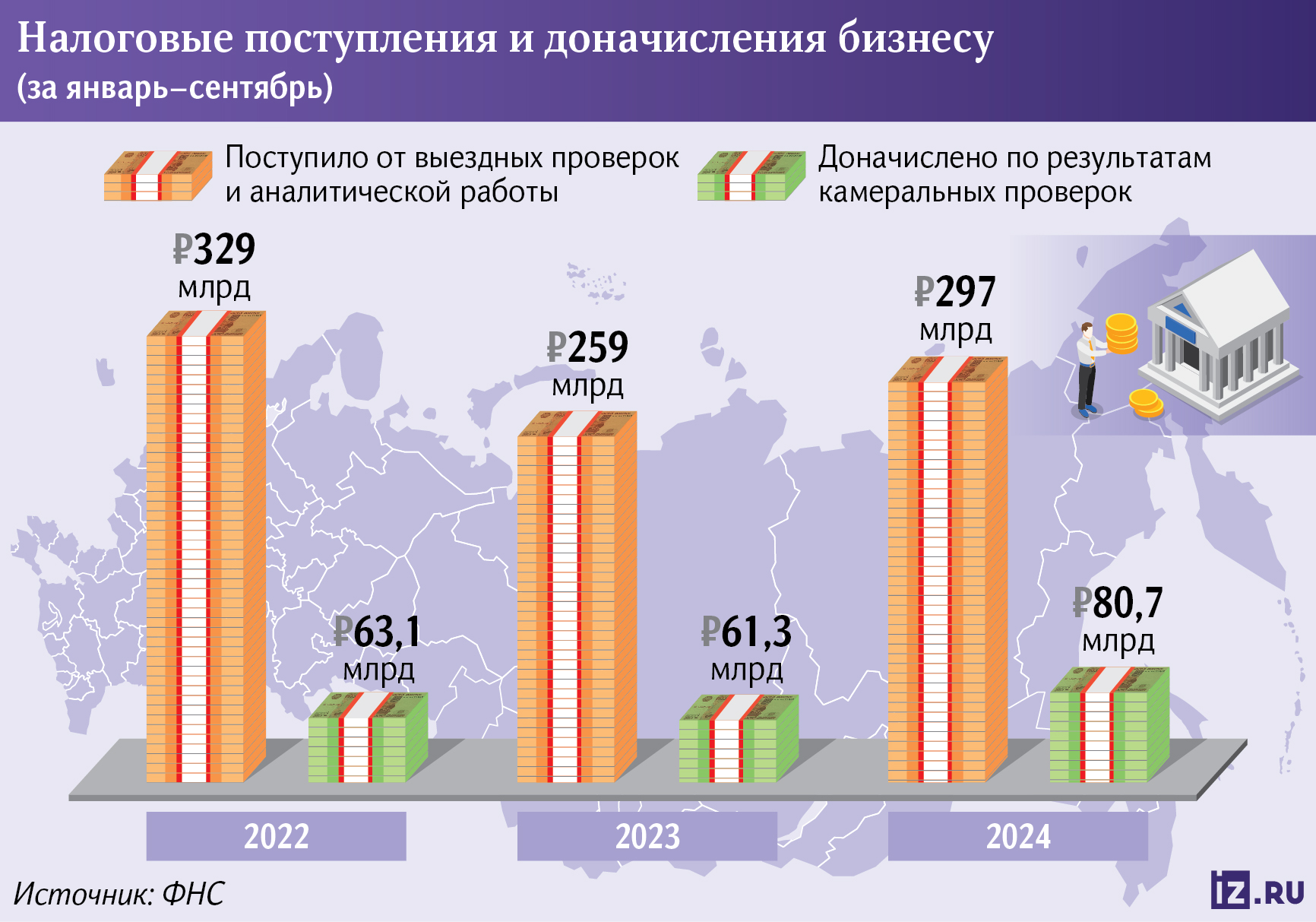Pay your taxes: the Federal Tax Service has strengthened its control over businesses

The Federal Tax Service has again increased additional charges to businesses based on the results of tax audits. Although in 2023 such charges were decreasing, in 2024 they increased again to almost 310 billion rubles, Izvestia found out. And mainly due to desk audits, not field audits. Document-based control poses less of a threat to companies and does not block their work, but there is a higher risk of mistakes, the business complains. It takes a long time and is expensive to challenge them. How it presses on companies in the conditions of sanctions, high key and increasing tax rates - in the material of "Izvestia".
Tax additional charges to business
The tax authorities conducted 3.3 thousand on-site inspections in 10 months of last year, according to the results of which almost 229 billion rubles were additionally charged, as follows from the statistics of the Federal Tax Service (Izvestia has familiarized itself with it). These funds must be paid by the companies, which the service found to be in violation of the payment of fees to the budget. During this period, the tax service conducted 40 million desk (or documentary) inspections and demanded that businesses pay an additional 80 billion rubles based on their results. In total, for the first 10 months of 2024, the Federal Tax Service additional tax payments to businesses amounted to 309 billion rubles.
In 2023, the amount was slightly less: based on the results of desk and field audits, the tax authorities charged the business 300 billion rubles for 10 months (of which 60 billion based on the results of desk audits and 240 billion - on the results of field audits), follows from the statistics of the Federal Tax Service. Then the pressure on companies has significantly decreased compared to 2022, when the total amount of additional charges amounted to 593 billion rubles.
Judging by the data of the service, additional charges this year are growing precisely based on the results of desk audits, while the results of field audits, on the contrary, are decreasing. This is due to the fact that the tax authorities are constantly improving approaches to document control on the basis of risk prioritization, the Federal Tax Service told Izvestia. The primary task is to promptly suppress tax evasion schemes, they emphasized.
The risk-oriented approach made it possible to focus on unscrupulous taxpayers, increasing the efficiency of the tax authorities in detecting violations, the tax authorities concluded.
Field and desk audits
Transparency of business operations is increasing - the tax authorities automatically check their data with their own, based on which they identify violations, explained Pavel Martynchenko, a lawyer on international and tax law. Therefore, the need for labor-intensive field audits is reduced.
However, documentary audits have their disadvantages. With this variant of control, the service finds out whether the company has correctly filled in the declaration and calculated its taxes. If there are errors, the FTS may charge the missing amount, penalties or impose a fine, depending on the situation.
However, the problem is often not that the company wanted to hide income, but that it simply did not have time to react to the changes, said Antonina Levashenko, a senior researcher at the Laboratory for Analysis of Best International Practices of the Gaidar Institute. For example, in 2024 there were changes concerning VAT: new forms of declarations, invoices, rules of payment when selling EAEU goods through electronic trading platforms and so on, she said.
During desk audits, there is a greater risk of erroneous decisions of the tax authorities and inflated claims. As Pavel Martynchenko stressed, the decisions, of course, can be appealed in pre-trial and judicial proceedings, but then the organization still incurs significant monetary costs.
- In any case it is additional expenses, time costs, the need to engage lawyers, - said Alexey Moshkin.
Is the pressure on business really growing?
Nevertheless, the fact that the total amount of additional charges has started to grow again means that business is under increasing pressure from the authorities, experts explained to Izvestia.
Additional payments can reduce profitability, limit working capital, and create additional risks, especially for small and medium-sized businesses, which are often the most vulnerable to such pressures, said Antonina Levashenko of the Gaidar Institute. This creates difficulties for organizations, as the general environment for development is not the most favorable now.
The companies' profits are already shrinking. According to Rosstat, in January-November 2024 it fell by 15% compared to the same period in 2023 - to Br27 trillion. Additional deductions may additionally have a negative impact on financial indicators.
In addition, companies are under pressure from the high key rate: it has been kept at 21% since October and is likely to remain there after the February meeting. In addition, from 2025, the authorities have raised the corporate income tax to 25%, which generally reduces profitability. Finally, the business climate is still influenced by sanctions.
On the other hand, experts note that document-level inspections are a much more painless way of control for entrepreneurs. Companies have a more difficult time with on-site inspections.
- An on-site inspection is one of the worst things that can happen to a business. For many companies, it ends in complete closure. And by and large, no one needs an on-site audit - neither the FTS, nor the taxpayer. Now everything has shifted to voluntary additional payment and desk inspections," said Alexei Moshkin, a tax consultant and member of Business Russia.

It is extremely important for tax authorities to take a risk-oriented approach, said Sergei Yelin, head of the audit and consulting group AIP, an expert on financial and legal security of business at the Moscow branch of "Opora Rossii". He said that now more and more often the Federal Tax Service first explains to the company its violations and offers to voluntarily clarify obligations by submitting a declaration before the audit. This makes it possible to avoid additional charges and penalties, which is the most acceptable option for businesses.
Переведено сервисом «Яндекс Переводчик»







